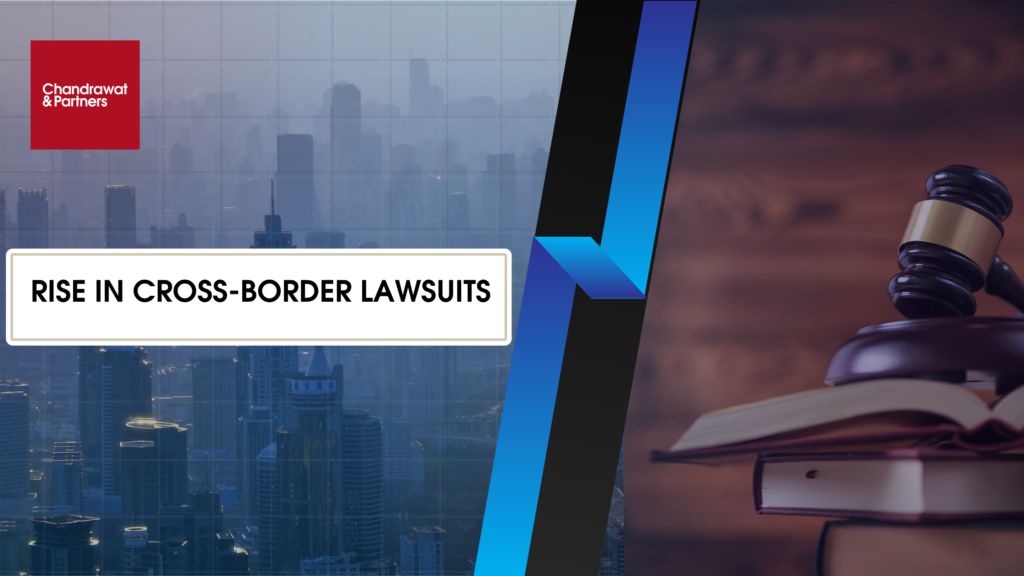
RISE IN CROSS-BORDER LAWSUITS
THE BORDERLESS WORLD OF LEGAL DISPUTES
The process of globalization is fundamentally transforming the legal profession. As international trade and investment flourish, legal disputes that transcend national borders are becoming increasingly common. This trend compels us to examine the complexities of cross-border litigation, a field with far-reaching consequences for a wide range of stakeholders, including businesses of all sizes, individual citizens, and legal practitioners around the world.
FACTORS DRIVING GLOBAL LITIGATION
The rise of global litigation can be attributed to several key factors.
- The Rise of Global Trade: The exponential growth of international commerce in recent decades means there are simply more opportunities for disputes to arise. Supply chains now routinely crisscross continents, and a breach of contract in one country can have a ripple effect, impacting businesses and individuals across the globe.
- Harmonization of Laws: In an effort to foster economic integration, many countries are working to harmonize their legal frameworks. However, these efforts can be uneven, leading to confusion and inconsistencies. For example, two countries might have similar laws on product liability, but the way those laws are interpreted and enforced by the courts could be vastly different. This lack of uniformity can create uncertainty and pave the way for litigation.
- The Power of the Internet: The digital age has undoubtedly facilitated cross-border transactions and communication. However, it has also opened doors for new types of legal issues, such as online fraud, copyright infringement, and data privacy breaches. These issues can be particularly complex in the context of global litigation, as they often involve parties located in different jurisdictions with varying laws and regulations.
- Third-Party Litigation Funding: The emergence of litigation funding firms has significantly altered the landscape of cross-border disputes. In the past, smaller companies or individuals might have been hesitant to pursue claims against larger entities in international courts due to the prohibitive costs. However, litigation funding firms level the playing field by providing financial backing to plaintiffs in exchange for a share of any potential winnings. This increased access to funding has undoubtedly contributed to the rise of global litigation.
OVERCOMING CHALLENGES IN CROSS-BORDER DISPUTES
Global litigation presents a unique set of challenges. Here are some hurdles litigants must consider:
- Jurisdiction: Determining which court has the authority to hear the case can be a complex battle in itself. International treaties and jurisdictional rules come into play, requiring careful legal maneuvering.
- Enforcing Judgments: Even if someone wins case in their country, enforcing the judgment in another can be a difficult. Different legal systems and recognition of foreign judgments creates potential roadblocks.
- Discovery and Evidence Gathering: Obtaining evidence from across borders can be a logistical and legal nightmare. Different rules of discovery and data privacy regulations make it a complex dance.
THE FUTURE OF GLOBAL LITIGATION
The rise of global litigation presents both challenges and opportunities. There is expected to be a change in the future with key trends emerging as follows-.
First, the demand for lawyers with expertise in international law and specific industries is likely to grow. These specialists will be well-equipped to navigate the complexities of cross-border disputes and advise clients on the nuances of different legal systems.
Second, alternative dispute resolution (“ADR”) methods like arbitration and mediation are also likely to gain favor. ADR can provide a faster and more cost-effective way to resolve cross-border disputes compared to traditional litigation in national courts.
Finally, technological advancements will continue to play a major role in shaping the future of global litigation. Legal technology can streamline communication between lawyers and clients located around the world, facilitate the gathering and exchange of evidence, and even translate legal documents into different languages. These advancements will make global litigation more manageable and accessible for a wider range of parties.
HOW WE CAN HELP?
- In cases inundated with mass documentation, our firm leverages advanced technology and highly skilled personnel to streamline the review, categorization, and management of documents. By deploying cutting-edge tools, we simplify the discovery phase and facilitate seamless access to pertinent information, enabling us to build stronger arguments and make informed decisions.
- Our team of professionals assist in sophisticated e-discovery tools to robust case management software, we harness technological advancements to enhance efficiency, accuracy, and transparency at every stage of the litigation process.
- Our experts understand that the foundation of a successful litigation strategy lies in meticulous case analysis and strategic formulation. Our team conducts rigorous assessments to identify the strengths and weaknesses of each case, discern potential risks, and develop tactical approaches to capitalize on favorable aspects while mitigating liabilities. Through collaborative efforts and innovative thinking, we craft personalized strategies tailored to achieve our clients’ objectives with precision and efficacy.
For more information or queries, please email us at
[email protected]
Key Contact

Surendra Singh Chandrawat
Managing Partner

